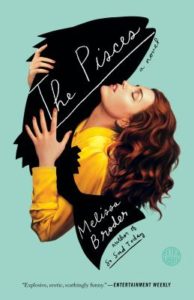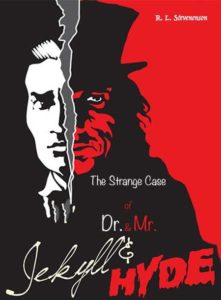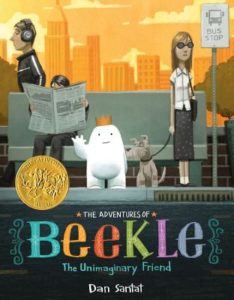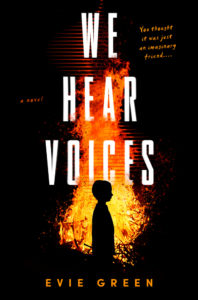In a sense, every character is an imaginary friend. Whether you’re reading or writing, there they are, chatting away in your head. They’ll take you to places, entertain you and give you ideas, while having no corporeal existence whatsoever.
As a child I would imagine friends from time to time but they never stuck around for long (they made their way, instead, into stories I was writing). When I started writing We Hear Voices, though, I became entirely preoccupied with the idea of the voice in your head that leads you to behave, in some way, differently. Imaginary friends can help, reassure, bolster, or they can be a lot more sinister than that. Here are eight very different books that feature them in eight very different ways.
Chocky by John Wyndham
This is what started me on the thought process in the first place: I found a copy of Chocky, John Wyndham’s 1968 novella, in a charity bookstore and re-read it in a single sitting. Twelve year old Matthew Gore has an insistent and uncanny voice in his head, and his father is worried because he thinks his son is too old for an imaginary friend. Chocky, though, turns out not to be as straightforward as the adults imagined (no spoilers here). Rereading this exquisitely spooky book planted the idea of writing my own imaginary friend novel, and of trying to capture the eerie feeling of the voice taking over a child’s consciousness, with an agenda of its own.
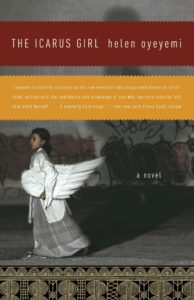
The Icarus Girl by Helen Oyeyemi
Eight year old Jessamy lives in London with her Nigerian mother and British father. On a visit to her mother’s family in Nigeria she meets her first real friend, a girl she calls TillyTilly. TillyTilly takes Jess to forbidden, impossible places and makes her see the things differently. Jess goes home to London: a little while later TillyTilly turns up saying she’s just moved in nearby. It takes Jess a while to realize that no one else can see her new friend, and she struggles to resist acting on TillyTilly’s more destructive ideas. Through her new friend Jess discovers a truth about herself that she had never consciously known before, but which, perhaps, has been at the root of her anxiety all along. Sinister and scary, this is a gripping read all the more impressive because of the fact that it was written while the author was still at school.
Memoirs of an Imaginary Friend by Matthew Green
The child at the centre of this story, Max, is also eight, and also a loner. In this world imaginary friends have the appearance and powers that the children (or in one case here, an adult) imagined for them. So Budo, our narrator, is pleased to look almost like a regular human, and thanks to his creator Max Delaney, has the power to go through doors (but not walls) and to head off to other places when Max doesn’t need him. Budo is devoted to Max, who is neurodivergent, and when Max vanishes at a time when Budo isn’t with him, has to turn detective and ultimately face a choice between confronting his own greatest fear, and saving his human.
The Light Jar by Lisa Thompson
Eleven year old Nate and his mother are running away in the middle of the night, from (we swiftly learn) a controlling stepfather. They camp out in an abandoned cottage they stayed in years before, his adoring Mom trying to make it fun. The next morning Mom goes out to buy food . . . and doesn’t return.
Nate finds himself alone and scared, in an inaccessible cottage with only the tins of food in the cupboard. No one knows he’s there, and he’s too scared of his stepfather to go for help. This, then, is exactly the time for his childhood imaginary friend, Sam, to reappear. With Sam and a girl from the local manor house who is fixated on solving a decades-old treasure hunt, Sam finds a way through the days and eventually takes control of his situation. This is a children’s book, and it doesn’t hold back, emotionally.
The Pisces by Melissa Broder
Adults can have magical friends who turn up just when they’re needed too. Lucy, recovering from a traumatic break up, is house sitting for her sister in Venice Beach and attending group therapy with other women whose relationships veer toward the self destructive. Late one night, sitting on a rock, she meets a strange swimmer who is reluctant to get out of the water, and then we discover why. Theo is a merman, and this book contains a lot of hot merman sex, and is dripping with satire. A joyous, alarming, angry read that reworks myths and casts a scathing eye over society.
The Strange Case of Dr Jekyll and Mr Hyde by Robert Louis Stevenson
I don’t think it’s a spoiler to say that Dr Jekyll and Mr Hyde are different versions of the same person, given the way the names have entered the lexicon. A gothic novella that centres on the narrator, Utterson’s, uncovering of the truth about the respected doctor and the wanted murderer. Dr Jekyll is a fine upstanding citizen, but his darker side, Mr Hyde, comes out when he takes the potion he has invented. I love the airy way in which Stevenson’s Jekyll explains that he ‘managed to compound a drug’ that changes someone’s outer appearance into a vessel for everything dark inside them. We don’t need more science than that. The drug becomes unpredictable, Jekyll loses control, and events spiral.

Magic by William Goldman
This is the classic story of a failing magician, Corky, and the ventriloquist’s dummy, Fats, who makes him into something of a star. Corky is at his lowest ebb, gassing himself in his apartment after a disastrous magic show, when a voice says, ‘what are you doing, killing yourself? It seems silly’. From then on, Fats the dummy is Corky’s harshest critic and ticket to success. Magic is the story of Corky’s breakdown, his running back home to find Peggy, the girl he loved in his youth, and an escalation into extreme violence when, no matter what he does, he can’t leave wisecracking Fats behind. At one point his agent challenges him to ‘make Fats shut up for five minutes’: he discovers he can’t even do that. Events escalate. Blood may be spilled. This was made into a highly popular film starring Anthony Hopkins in 1978.
The Adventures of Beekle The Unimaginary Friend by Dan Santat
Finally, a picture book. This is the fabulous story of Beekle, who waits on the imaginary friends’ island for a child to conjure him. While the friends around him are picked, one by one, Beekle, a small character wearing a crown, is left behind. Eventually he takes matters into his own hands and does ‘the unimaginable’, travelling to the real world in search of a friend. Nothing works out how he expected, but he makes it in the end. This is a heartwarming look at feeling like an outsider, being brave, and finding your friends.
***





